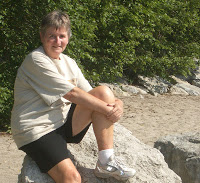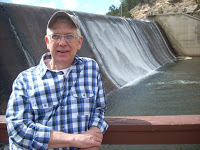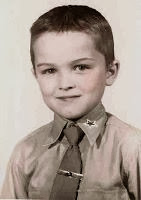There are plenty I’m reminded of every time I look in a mirror! This scraggly old turkey-neck could lose some wrinkles to start with. The bags under the eyes could disappear along with the gray hair, and there could simply be … well …. less of me. Many pounds less of me. But I have no intention of buying overpriced skin cream nor coloring my hair, and seem quite incapable of taking either diet or exercise too seriously, so I suspect the changes I see in the mirror will be those I would rather not see. On the other hand, the things I don’t see in the mirror, those things which make up my inner self, my soul, however you choose to think of it, I am pretty happy with. My psyche seems to be doing OK and actually going in the right direction, and I provide as much spiritual help as I can give it. I think that is why I don’t worry much about the negatives offered up by the mirror. They just do not seem important.
Looking out at the world through plain glass, however, is a very different matter. Perhaps because I so love taking photographs myself, some of the memories burned into my brain come in the form of photos I have seen over a lifetime. And they mostly represent things I hope never to see again. For humanity, that is the change I would like to see; simply never to see such things again. Never again to see photos of beautiful old cities carpet-bombed in the way The Allies punished Dresden, managing to kill an estimated 135,000 people in one nightmare nigh. I hope never again to see photos of thousands of refugee children, as in post World War Two Europe. The photos were posted in the hope that someone would recognize these poor tattered, shattered, bodies and souls, and return them to someone who loved them. I would like to see a world where we don’t look at photos of a little naked girl running from the napalm destruction of all she knows. The Siege of Sarajevo’s 20th anniversary was memorialized in 2012. Empty red chairs were set out in the main street, symbolizing 11,541 victims of the war. 643 of the chairs were small, representing the slain children. On some of them, during the day-long event, passers-by left teddy bears, little plastic cars, other toys or candy. I hope never to see a picture like that again. At one Storytime last year I passed around a photo I think says it all about the horror that is now Syria; a tiny little child, obviously near death from starvation, being eyes greedily by a hungry vulture. I won’t inflict it on you again today, but it still haunts me.
I very much want to see a changed world in which such terrible photographs represent an awful past from which we have recovered and moved on. Somehow I doubt that. In fact at this time, with two madmen with their fingers on red buttons, it seems less likely than ever. Being a political pessimist ain’t easy. And so, I’m back to me again. I started out saying I was pretty happy with the way I feel inside. But should I be seeking to change, at the very least, my political pessimism? No, I don’t think so. If I were a real true pessimist that might be different; it must surely be depressing always to expect the worst from life. But being a political pessimist I really believe brings me peace. It’s very much the philosophy of hope for the best but prepare for the worst which I find to be very practical political advice. I found a wonderful quote from Thomas Hardy, who said, “And as I am surely approaching that infamous stage of life, second childhood, I’m sure I’m much better off sticking with child’s play.”
© January 2018
About the Author
I was born and raised in England. After graduation from college there, I moved to the U.S. and, having discovered Colorado, never left. I have lived in the Denver-Boulder area since 1965, working for 30 years at IBM. I married, raised four stepchildren, then got divorced after finally, in my forties, accepting myself as a lesbian. I have been with my wonderful partner Betsy for thirty years. We have been married since 2013.









